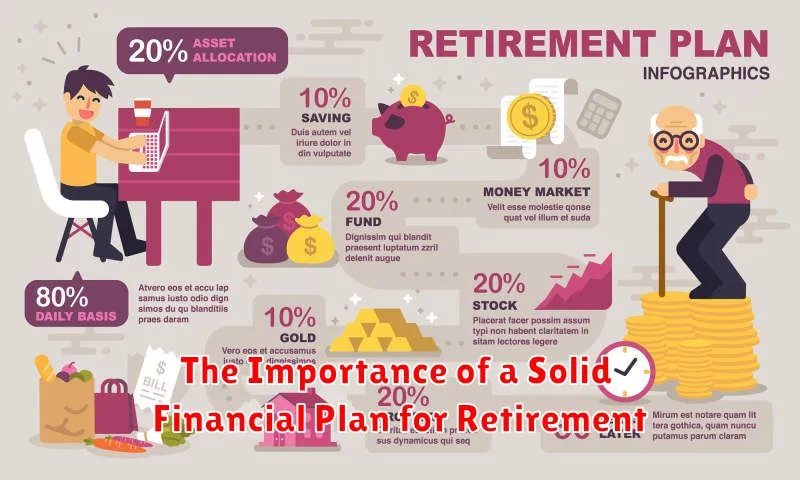Retirement is a time to enjoy the fruits of your labor and finally live life on your own terms. However, many retirees find themselves struggling financially, especially if they haven’t planned properly. Reducing expenses in retirement can be a challenge, but it doesn’t have to mean sacrificing your lifestyle. There are plenty of ways to cut costs without feeling like you’re missing out on the things you love.
This article will guide you through practical strategies for reducing expenses in retirement while still maintaining your desired quality of life. We’ll explore everything from smart budgeting techniques and negotiating bills to uncovering hidden costs and finding cost-effective ways to enjoy your favorite hobbies. Get ready to learn how to live a fulfilling and financially secure retirement without breaking the bank.
Understanding Your Retirement Budget: Needs vs. Wants
Retirement is a time for relaxation and enjoying the fruits of your labor. However, it’s also a time when your income may be reduced, so it’s crucial to create a budget that ensures you can live comfortably without depleting your savings. To do this, it’s essential to distinguish between your needs and wants.
Needs are essential expenses that you cannot live without. These include housing, food, healthcare, transportation, and utilities. Wants, on the other hand, are expenses that provide comfort and enjoyment but are not essential for survival. This could include dining out, travel, hobbies, entertainment, and luxury items.
By understanding the difference between your needs and wants, you can start to identify areas where you can cut back on expenses without sacrificing your quality of life. Prioritizing your needs over your wants can help you stretch your retirement funds further and enjoy a more secure and financially stable retirement.
Downsizing Your Home: Pros, Cons, and Alternatives
Downsizing your home can be a significant decision with both potential benefits and drawbacks. As you consider this option for reducing expenses in retirement, it’s crucial to weigh the pros and cons carefully.
Pros of Downsizing
- Reduced Housing Costs: A smaller home generally translates to lower mortgage payments, property taxes, and utility bills. This freed-up cash can be used for travel, hobbies, or other retirement pursuits.
- Less Maintenance: Downsizing means less space to clean, maintain, and repair. This can free up your time and energy for more enjoyable activities.
- Increased Financial Flexibility: Selling your larger home can provide a lump sum of money that can be invested, used to pay off debt, or simply provide financial security.
- Simplified Lifestyle: Downsizing can encourage a more minimalist lifestyle, reducing clutter and stress.
Cons of Downsizing
- Emotional Attachment: Many homeowners have strong emotional connections to their homes, and downsizing can feel like a loss.
- Loss of Space: Moving to a smaller home may require getting rid of possessions and adjusting to less space.
- Potential for Financial Loss: If the real estate market is not favorable, you may not be able to sell your home for the price you desire.
- Moving Costs: Downsizing involves moving expenses, which can be significant.
Alternatives to Downsizing
- Downsizing Within Your Home: Instead of moving, consider simplifying and decluttering your current home to make it feel more manageable.
- Renting Out Space: If you have spare rooms, consider renting them out for additional income.
- Reverse Mortgage: This option allows homeowners aged 62 or older to access equity in their home without selling it.
- Aging-in-Place Modifications: Make necessary modifications to your home to make it easier to live in as you age, potentially avoiding the need to move altogether.
Downsizing your home can be a significant step toward reducing expenses in retirement. Weigh the pros and cons carefully, explore alternative solutions, and choose the option that best suits your individual needs and goals.
Creative Ways to Generate Passive Income Streams
As you approach retirement, it’s crucial to find ways to supplement your income without sacrificing your desired lifestyle. Passive income streams can provide a reliable source of revenue while freeing up your time to enjoy your golden years. Here are some creative ideas to consider:
1. Rent out a property: If you own a spare room, a vacation home, or even an unused parking space, renting it out can generate regular passive income. Platforms like Airbnb and VRBO make it easy to list your property and attract tenants.
2. Create and sell online courses: Share your expertise and knowledge by creating online courses on platforms like Udemy, Teachable, or Skillshare. This allows you to reach a global audience and earn recurring revenue from your expertise.
3. Invest in dividend-paying stocks: Dividend-paying stocks offer regular income streams based on your investment. Research companies with a history of paying dividends and consider diversifying your portfolio to mitigate risk.
4. Write and sell ebooks: If you have a passion for writing, consider writing and selling ebooks on Amazon Kindle Direct Publishing. This allows you to tap into a vast market and earn royalties on each sale.
5. Affiliate marketing: Partner with businesses and promote their products or services on your website or social media channels. Earn a commission for every successful referral you generate.
6. Develop and sell apps: If you possess programming skills, create and sell mobile apps on platforms like Google Play Store or Apple App Store. This can generate passive income from app downloads and in-app purchases.
7. License your creative work: If you are a musician, artist, photographer, or writer, consider licensing your creative work for use in various media. This can provide ongoing passive income from your creations.
These creative ways to generate passive income can provide a steady stream of revenue to supplement your retirement savings and help you enjoy your golden years without financial worries.
Managing Healthcare Costs in Retirement
Healthcare is one of the biggest expenses retirees face. As you age, your health needs will likely increase, which means you’ll need to pay more for healthcare. Fortunately, there are ways to manage these costs without sacrificing your lifestyle. Here are some strategies you can implement:
Stay healthy. This is the most important thing you can do to keep healthcare costs low. Eat healthy foods, exercise regularly, and get enough sleep. You should also get regular checkups and screenings to catch any potential problems early on.
Choose a high-deductible health plan. If you’re healthy and don’t expect to need a lot of healthcare, a high-deductible health plan (HDHP) can save you money on your premiums. With an HDHP, you’ll pay a lower monthly premium, but you’ll have to pay a higher deductible before your insurance starts to cover your healthcare costs. This may be a good option if you’re confident you won’t need much medical care.
Enroll in Medicare Part D. Medicare Part D is a prescription drug plan that can help you save money on your medications. You’ll need to choose a plan that’s right for your needs and budget. Consider options like a mail-order pharmacy to potentially save on costs.
Shop around for healthcare services. Healthcare costs can vary depending on the provider and the location. You can save money by shopping around for the best deals. Remember that you don’t have to go to your doctor or hospital for every healthcare need. There are many affordable options, such as telehealth services and retail clinics.
Take advantage of discounts and programs. Many organizations offer discounts and programs to help seniors save on healthcare costs. For example, the AARP offers discounts on health insurance and prescription drugs. Be sure to ask your doctor, pharmacy, and other healthcare providers about any discounts they may offer.
Making the Most of Senior Discounts and Benefits
Senior discounts and benefits are a valuable resource that can help you maintain your lifestyle in retirement without breaking the bank. These programs offer significant savings on everything from groceries and utilities to travel and entertainment. Taking advantage of these discounts can be a smart way to stretch your retirement income and keep your budget in check.
Start by researching local and national programs designed for seniors. Many retailers and service providers offer discounts to seniors, and some organizations offer exclusive benefits like free museum passes, transportation services, and prescription drug assistance. You can find comprehensive lists online or contact your local Area Agency on Aging (AAA) for personalized recommendations.
Don’t hesitate to ask about discounts whenever you are shopping or making purchases. Many businesses are happy to offer discounts to seniors, but they may not advertise them openly. Be sure to carry your senior ID or birth certificate as proof of age. You may also find that seniors who shop during off-peak hours or on weekdays often receive additional discounts.
Finally, consider joining a senior center or a similar organization. These groups often provide valuable information about local discounts and benefits, and they can also offer social and recreational activities. Getting involved in your community can be a great way to save money and stay active in retirement.
Traveling on a Budget During Retirement
Retirement is a time to explore the world and fulfill those travel dreams you’ve always had. However, many retirees are concerned about the financial strain of traveling. The good news is, you can still travel on a budget without sacrificing your travel goals! Here are some tips to help you maximize your travel dollars:
Choose your destinations strategically. Consider destinations that are off the beaten path or travel during the off-season when prices are lower. Many affordable destinations offer stunning scenery, delicious food, and rich cultures to explore. You can also consider traveling to destinations with a lower cost of living.
Look for deals and discounts. Many airlines and travel sites offer discounts for seniors or retirees. Also, don’t forget to explore opportunities for free or discounted activities. This could include walking tours, free museum days, and attending local events.
Be flexible with your travel plans. Consider flying into smaller airports or taking advantage of overnight flights to save on airfare. Booking your flights and accommodations in advance can also help you find better deals.
Embrace the experience of traveling independently. Avoid expensive tours and consider exploring destinations independently through public transportation, walking, or biking. This gives you greater flexibility and allows you to see the world at your own pace.
Make the most of your accommodations. Explore options like hostels, Airbnb rentals, or even house-sitting to save on accommodation costs. You can also consider staying in apartments or condos with kitchens to prepare some of your meals.
Enjoy free activities. Many destinations offer free activities like hiking, biking, swimming, or picnicking. Take advantage of these activities to enjoy the outdoors and stretch your budget further.
By following these tips, you can significantly reduce your travel expenses and still enjoy fulfilling trips throughout your retirement years.
Smart Strategies for Reducing Housing Costs in Retirement

Your home is likely your largest expense, so reducing those costs in retirement can significantly impact your financial well-being. Fortunately, there are several smart strategies you can implement to lower your housing expenses without sacrificing your lifestyle. Here are a few ideas:
Downsize Your Home
Moving to a smaller home can drastically reduce your mortgage payments, property taxes, and maintenance costs. Consider a condo, townhome, or smaller single-family home in a less expensive area. You could also explore options like retirement communities, which often provide amenities and services that can offset the cost of living.
Rent Out a Room or Part of Your Home
If you have extra space, renting out a room or part of your home can provide a significant source of income to offset your housing expenses. Consider using a website like Airbnb to find short-term renters or connect with long-term tenants through traditional rental channels.
Refinance Your Mortgage
Refinancing your mortgage to a lower interest rate can save you money on your monthly payments. However, make sure to factor in closing costs and ensure you are locking in a rate that will benefit you long-term.
Consider a Reverse Mortgage
A reverse mortgage can be a valuable tool for homeowners over 62 who want to access equity in their homes without having to sell. It allows you to receive monthly payments, a lump sum, or a line of credit, potentially reducing your need for other income streams.
Explore Housing Options for Seniors
Several housing options cater specifically to seniors, offering amenities, services, and social activities that can enhance your quality of life. These options may include retirement communities, assisted living facilities, or continuing care retirement communities. While these options often come with monthly fees, they can provide peace of mind and simplify your lifestyle.
Negotiate Your Property Taxes
In some areas, you may be eligible for property tax breaks or exemptions for seniors. Research your local tax laws and inquire about potential savings opportunities.
By taking advantage of these strategies, you can reduce your housing expenses in retirement, free up valuable income, and ensure a more financially secure future. Remember to carefully consider your individual circumstances, financial goals, and lifestyle preferences when exploring these options.
Finding Affordable Entertainment and Leisure Activities

Retirement is a time to enjoy life to the fullest, but it’s important to find ways to do so without breaking the bank. There are plenty of affordable and enjoyable activities to pursue that will keep you entertained and engaged.
Consider taking advantage of free community events, such as concerts, festivals, and farmers markets. These are excellent opportunities to socialize, enjoy live entertainment, and support local businesses. Many libraries offer free programs, lectures, and book clubs, providing opportunities for learning and engagement.
Exploring your local parks and trails is a great way to get exercise and enjoy the outdoors. Many parks offer free fitness classes, hiking trails, and picnic areas. If you’re passionate about a particular hobby, look for local clubs or groups that offer free or low-cost classes and workshops.
Instead of going to expensive restaurants, try cooking at home more often or exploring local food trucks and markets. You can also look for discounted tickets to movies, concerts, or sporting events online or through local organizations.
By getting creative and seeking out affordable options, you can enjoy a fulfilling retirement without sacrificing your lifestyle.
The Importance of a Solid Financial Plan for Retirement

Retirement is a significant life transition, and it’s crucial to have a well-defined financial plan to ensure a comfortable and fulfilling lifestyle. A solid financial plan is not just about managing your finances; it’s about understanding your financial needs, goals, and risk tolerance.
A financial plan helps you:
- Estimate your expenses: You can accurately predict your monthly expenses and plan accordingly.
- Set realistic goals: This could be anything from traveling the world to pursuing hobbies or helping family members.
- Manage your assets: A good financial plan helps you decide how to invest your savings, manage your debts, and protect your assets.
- Plan for unexpected events: Life is unpredictable, and a financial plan helps you prepare for unforeseen circumstances like medical emergencies or job loss.
- Ensure financial security: A well-structured plan provides peace of mind and allows you to enjoy your retirement years without worrying about money.
By carefully planning your finances, you can avoid financial stress and maintain your lifestyle even after you retire. It’s a proactive approach that safeguards your future and empowers you to make informed decisions.
Cutting Transportation Costs: Tips for Retirees

Transportation can be a significant expense, especially for retirees who may have more time to travel or run errands. However, there are several ways to reduce transportation costs without sacrificing your freedom and enjoyment. Here are some tips for cutting transportation costs:
Plan your trips efficiently. Before you head out, plan your errands and appointments to minimize backtracking and unnecessary travel. This might involve grouping errands together, utilizing online mapping tools to find the most efficient route, and scheduling appointments strategically.
Consider public transportation. Many retirees live in areas with reliable and affordable public transportation systems. Buses, trains, and subways can be a cost-effective way to get around, especially for short to medium distances. Plus, you can relax and enjoy the scenery!
Utilize ride-sharing services. Apps like Uber and Lyft offer convenient and affordable ride-sharing options, especially for shorter distances. You can also consider carpooling with friends, family, or neighbors for longer trips.
Look for alternative modes of transportation. Biking, walking, and scooters are excellent options for short-distance travel. They’re great for exercise and can be enjoyable ways to explore your community.
Downsize your vehicle. If you have a large, gas-guzzling vehicle, consider downsizing to a smaller, fuel-efficient car. This can significantly reduce your fuel and maintenance costs.
Embrace car maintenance. Regular car maintenance can help you avoid costly repairs down the line. This includes getting regular oil changes, checking tire pressure, and addressing any warning lights promptly.
Explore alternative housing options. If you’re willing to make a move, consider relocating to a location with easy access to public transportation, walkable neighborhoods, or affordable transportation options.
By implementing some or all of these strategies, you can significantly reduce your transportation costs while still enjoying your retirement years to the fullest!
Exploring Part-Time Work or Freelancing Opportunities

Retirement doesn’t have to mean a complete cessation of income. Many retirees find fulfillment and financial stability by exploring part-time work or freelancing opportunities. This approach can help you maintain a comfortable lifestyle while reducing your reliance on savings.
Consider leveraging your existing skills and experience to find flexible work arrangements. You could:
- Offer consulting services in your field of expertise.
- Become a tutor or mentor in a subject you are passionate about.
- Provide freelance writing, editing, or graphic design services.
- Work as a virtual assistant or customer service representative.
- Take on short-term projects or contract work.
Platforms like Upwork, Fiverr, and LinkedIn can connect you with potential clients. Remember to set your rates fairly and ensure your work meets high standards. This supplemental income can help cover everyday expenses, allowing you to stretch your retirement savings further.

